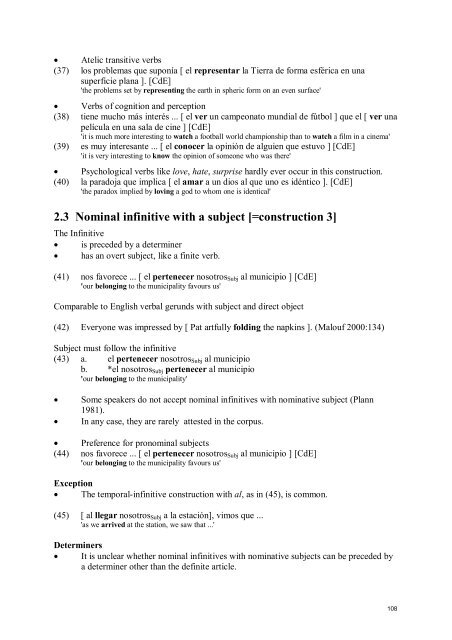morphological? - KOPS - Universität Konstanz
morphological? - KOPS - Universität Konstanz
morphological? - KOPS - Universität Konstanz
Create successful ePaper yourself
Turn your PDF publications into a flip-book with our unique Google optimized e-Paper software.
• Atelic transitive verbs<br />
(37) los problemas que suponía [ el representar la Tierra de forma esférica en una<br />
superficie plana ]. [CdE]<br />
'the problems set by representing the earth in spheric form on an even surface'<br />
• Verbs of cognition and perception<br />
(38) tiene mucho más interés ... [ el ver un campeonato mundial de fútbol ] que el [ ver una<br />
película en una sala de cine ] [CdE]<br />
'it is much more interesting to watch a football world championship than to watch a film in a cinema'<br />
(39) es muy interesante ... [ el conocer la opinión de alguien que estuvo ] [CdE]<br />
'it is very interesting to know the opinion of someone who was there'<br />
• Psychological verbs like love, hate, surprise hardly ever occur in this construction.<br />
(40) la paradoja que implica [ el amar a un dios al que uno es idéntico ]. [CdE]<br />
'the paradox implied by loving a god to whom one is identical'<br />
2.3 Nominal infinitive with a subject [=construction 3]<br />
The Infinitive<br />
• is preceded by a determiner<br />
• has an overt subject, like a finite verb.<br />
(41) nos favorece ... [ el pertenecer nosotrosSubj al municipio ] [CdE]<br />
'our belonging to the municipality favours us'<br />
Comparable to English verbal gerunds with subject and direct object<br />
(42) Everyone was impressed by [ Pat artfully folding the napkins ]. (Malouf 2000:134)<br />
Subject must follow the infinitive<br />
(43) a. el pertenecer nosotrosSubj al municipio<br />
b. *el nosotrosSubj pertenecer al municipio<br />
'our belonging to the municipality'<br />
• Some speakers do not accept nominal infinitives with nominative subject (Plann<br />
1981).<br />
• In any case, they are rarely attested in the corpus.<br />
• Preference for pronominal subjects<br />
(44) nos favorece ... [ el pertenecer nosotrosSubj al municipio ] [CdE]<br />
'our belonging to the municipality favours us'<br />
Exception<br />
• The temporal-infinitive construction with al, as in (45), is common.<br />
(45) [ al llegar nosotrosSubj a la estación], vimos que ...<br />
'as we arrived at the station, we saw that ...'<br />
Determiners<br />
• It is unclear whether nominal infinitives with nominative subjects can be preceded by<br />
a determiner other than the definite article.<br />
108

















